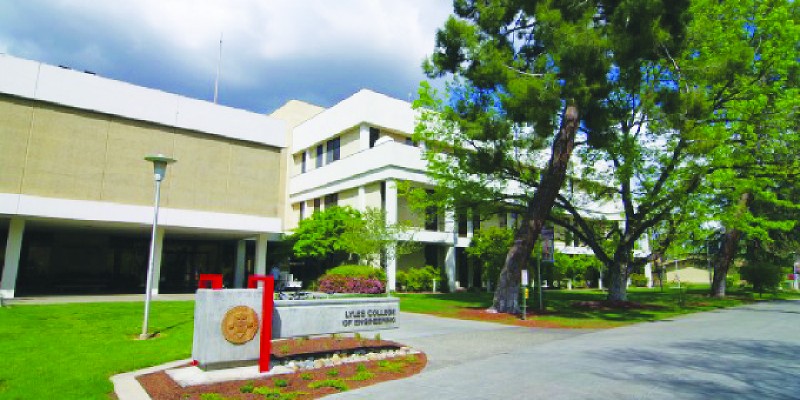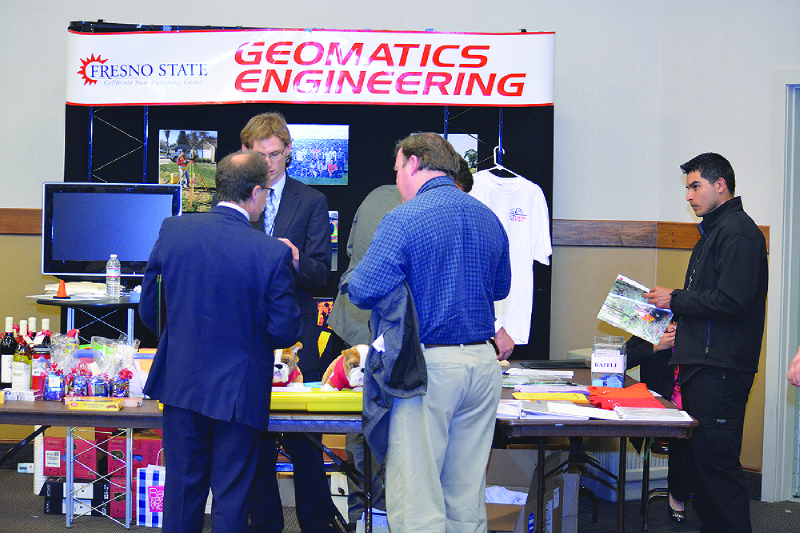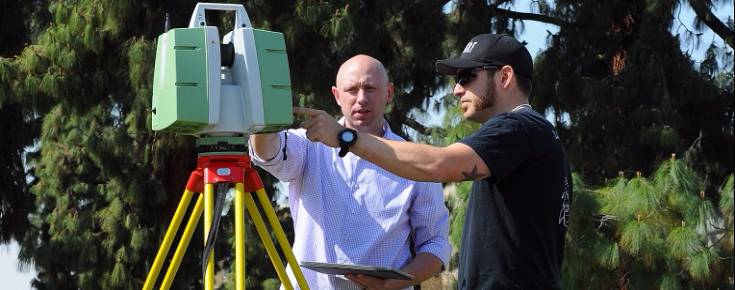Geomatics Engineering Program
By Scott Peterson and Stephen Castillo
California State University, Fresno (Fresno State), offers a Bachelor of Science degree in geomatics engineering, with no two-year option. Upon graduation, students are expected to enter a plethora of fields that include geodesy, land surveying, photogrammetry, remote sensing, geographic information systems (GIS), and global positioning systems (GPS).
Student Testimonials
Sophomore Hunter Stetson says,
I chose geomatics engineering because I took an introductory course on land surveying, as well as an internship that really opened my eyes to the amazing field of geomatics. Another reason I joined was because of the tight-knit community within the geomatics profession, with professionals, students, and professors alike motivating each other to help the field progress.
Junior Uriel Montejano says,
I chose geomatics engineering because I didn’t want to be stuck in an office for the rest of my life. I enjoy the outdoors, and that’s exactly what geomatics has to offer.
Sophomore Stephen Castillo says,
I didn’t know what engineering major I wanted to go for, and during an open house at Fresno State for the engineering college I happened upon the geomatics program. [Because so few people] knew that this diamond in the rough existed here at this university, I knew my job opportunities coming out of Fresno State would be essentially unlimited.
Internship Opportunities
Internships are not hard to find, with a majority of students finding internships by their sophomore summer as students in the program. With major California land surveying conferences–such as the annual, student-organized GME conference held by the Fresno State geomatics program [more at right] and the CLSA conference–students interacting with professionals in the field are able to obtain internships this way, as well. Some internships may even turn into future employment.
Notable companies that students intern with in California and elsewhere include: PG&E, BKF Engineers, BLM, Hawaiian Electric, and many more.
Conference
The Fresno State geomatics engineering program holds a student-run conference every year where professionals as well as former program graduates come together to learn more about geomatics from other professionals. Selected speakers give presentations on their areas of expertise within the field of geomatics, and during the scholarship banquet a majority of geomatics students receive scholarships totaling upwards of $60,000 each year.
Boundary Law
The teaching of and understanding of boundary law is an essential part of the curriculum at Fresno State. It is also critical to being a true professional land surveyor. The geomatics profession has been stereotyped as being a technical profession only, but geomatics engineers must know the following:
- where to look for evidence,
- what kind of evidence is good/bad,
- how to weigh the evidence,
- what case law has guided and directed past survey problems, and
- where to place their monuments.
A surveyor cannot properly know how to survey without understanding how the law affects the rights of the parties involved. At Fresno State, students learn case law, they learn how to interpret case law, and they learn to make intelligent decisions based upon the decisions brought about from case law.
Students are taught to understand that it’s okay to use the phrase, “it depends,” because the answer lies within the realm of understanding and interpreting evidence in different situations. Students are taught that every survey is different, and different legal principles must be applied to each situation in order to protect the rights of all parties. Overall, students begin to learn how to act and survey according to the correct legal principles with which a judge would concur.
The myth that geomatics engineers are button pushers must be dispelled, and the truth should shine that we utilize wonderful technology as a means to solve difficult problems.
Students at Fresno State are prepared with the tools necessary to become a true professional land surveyor. They learn and understand that after they have learned these legal principles, they then need the practice and experience under existing professionals to help better understand how to interpret real-world situations that they will not see in the classroom.
Unique Qualities
Compared to other land surveying programs in the United States, Fresno State has incredible program support from former graduates as well as small student classes that allow for an enhanced and intimate experience with professors.
Fresno State offers a full four-year ABET-accredited surveying engineering program, one of only a few in the U.S.
The road to licensure in California following graduation from Fresno State eliminates four years out of the six required to sit for the PLS exam. The process of testing for and receiving prerequisites for the PLS, such as the LSIT, is made a lot easier by the academic coursework.
Much credit can be given to current faculty, as individuals such as Dr. James K Crossfield and Dr. Fareed Nader have been crafting and molding surveyors for almost 30 years.



